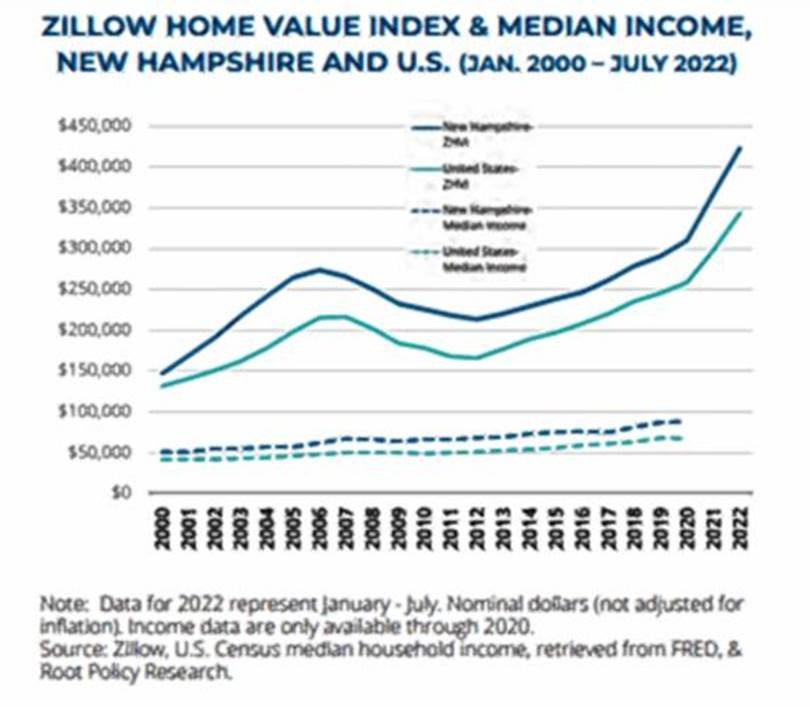NH needs 60,000 new units by 2030
For three decades economists have signaled that New Hampshire has a “housing mismatch” – or an Econ 101 issue where demand supersedes supply of available houses. But new numbers released by New Hampshire Housing illustrate what a vast discrepancy this has become.
Estimates say that the state will need 60,000 units by 2030 to meet current demand. By 2040, that number will grow to 90,000.
Four key factors are responsible for this growing shortage – homeownership challenges, rental availability, affordability and the aging demographics of the state.
Over the last three years, the median home price rose by 50% in the state, according to New Hampshire Housing.
With the pandemic leading to a influx of those buying second homes, especially in seasonal areas like Lake Winnipesaukee, many potential buyers in the state have opted not to purchase due to escalating costs and dwindling availability. This is especially true for middle- to high-income renters, who typically would phase out of the rental market.
But the estimated number of homes needed over the next decade does not account for seasonal and second-home owners. When factored into the equation, the state could need more than 110,000 new units by 2040, according to New Hampshire Housing.
And these issues are all interconnected. With fewer homeowners, the rental vacancy rate is at a record low. In 2022, the rental vacancy rate for all units in the state hovered at 0.5%. For two-bedroom units, it was 0.3%.
In a healthy market, where there is adequate supply of units to meet rental demands, vacancy rates should be 5%.
For those who are able to find a rental, they’re met with high costs. Rent has increased 94% over the last two decades. Home sale prices tell a similar story – with a 111% increase.
Meanwhile, median income over that period has increased by 73%, meaning home prices have outpaced wage growth.
Both home values and median income in New Hampshire are above United States numbers. And although housing expenses have outpaced income growth across the nation, the difference between prices in New Hampshire versus elsewhere, has continued to widen since 2000.
And the last piece of the state’s housing crisis lies in the aging demographics of New Hampshire. With population growth predicted to continue to slow through 2040, the state’s median age will become older.
With homeownership and supply, this means that many residents will “age in place,” with fewer children per household as they grow up and move out, limiting the availability of homes.
With these challenges, New Hampshire Housing says solutions lie in a boost of federal funding to increase housing development in the state.
To meet the current demand, the state needs to build 23,670 units. And in order to do that, local and state leaders need to prioritize issuing building permits to make this construction happen.
From 2017 to 2021, 4,000 building permits were issued per year, on average. New Hampshire Housing is recommending increasing that number by 36%, through 2030 – which equals an additional 1,440 permits per year.
Although the state has taken measures to support housing development – like creating the InvestNH program, which provides grants to developers, helps municipalities with planning and offers money for demolitions – additional funding and finance tools are needed, according to New Hampshire Housing.
Zoning changes to support building different types of housing across the state, and providing incentives for developments that have a higher density of units are also key solutions.
In Concord, a new proposed zoning code in the city hopes to expand development and housing density. The updated code is intended to encourage redevelopment and new developments in neighborhoods, according to Concord Next, an informational site about the project.
And in the next 18 months, the city will begin to chip away at the need to build, with 152 units to be constructed with InvestNH funding. With homeownership and supply, many residents will “age in place,” with fewer children per household as they grow up and move out, limiting the availability of homes.
https://www.concordmonitor.com/NH-Housing-Needs-Assessment-2023-released-50618281

